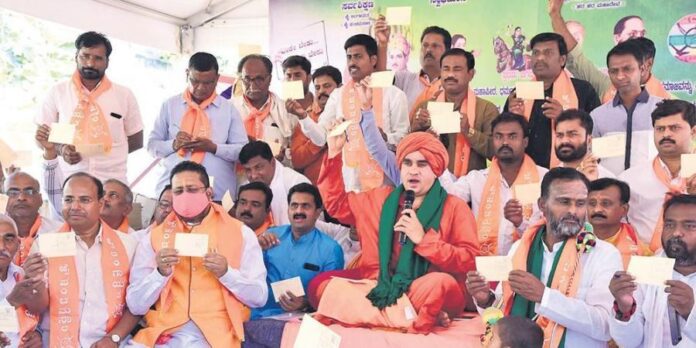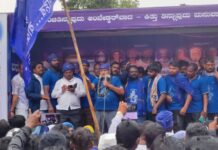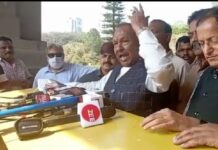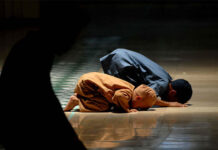…The representation ensured to the oppressed communities by Dr. B R Ambedkar in the Constitution of India, made a social change possible in the post Independent India. Due to this representation the access to education, employment opportunities and political participation freed itself from the monopoly of the upper castes and upper classes; the oppressed now have an access to all of these. Since people from different communities could receive education and could access employment opportunities, India, just in seventy years could witness an overwhelming development in the fields of art, science and technology. A review of the social, economic and political conditions of pre British India would explain to us as to why this development was an overwhelming one.
Dr. B R Ambedkar fought for decades to conceive reservation for the oppressed in the country. It is an aghast development indeed to see the people belonging to the shudra castes- those who have benefited by the reservation opposing reservations. The credit for this development goes to the vedic/brahmanical forces which have been successful in promoting intolerance and jealousy in just forty years. However, as the pervasiveness of the education system is being expanded, people are realising that the current proportion of reservation is not sufficient.
Also read: Comments made by the Chief Justice are an Affront to the Dignity of Women
The Supreme Court has ruled that reservation proportion must not cross fifty percent. Kurubas, Nayakas, Vokkaliga, Pachamasaalis in Karnataka are protesting and demanding for revision of the now reserved categories or increasing proportion of the reservation. This demand for changes in reservation does not discount the fact that Dr. B R Ambedkar based the reservation provided in the Constitution on social oppression. Unfortunately, modern India is not free from caste oppression and there is an unrest about the current representation for the oppressed. The demand to get rid of the caste based reservation and implement economic reservation is intensifying. It is an established fact that this demand is influenced by the vedic/brahmanical forces.
Ever since the Bharatiya Janata Party formed its government in the centre the demand for doing away with social status based reservation has intensified. The noise for economic reservation is being loud and persistent. Fueling this noise, the BJP government, in 2020 decided to provide ten percent reservation for the economically backward upper castes. This is an unconstitutional move by the government. This move would set a dangerous precedent as it encourages the socially powerful to hunt for the reservation meant for the oppressed communities. Several cases have been filed in the Supreme Court against this unconstitutional move by the government and the Apex Court has not heard any of these cases.
Also read: SKM Urges Farmers to Take Care of Their Crops and Produce Along With the Movement
Against this backdrop, Gujjar community in Rajasthan, Patidar community in Gujarat, Panchamasali and vokkaliga communities in Karnataka are demanding a revision of reservations. Instead of demanding a one hundred percent population based reservation, these communities, unfortunately, have been fighting for their inclusion into the categories of the week and the artisans. Let us remember one thing, the communities that vehemently opposed reservations in the 1990s are now demanding for reservations based on economic status. The only way to reach a logical conclusion in this debate is by amending the Constitution and introducing one hundred percent population based reservation.
Population Based Reservation
The sheer large number of castes, tribal and nomadic tribe communities in India has raised several questions regarding the feasibility and inclusiveness of the population based reservation. There are several communities whose population is less than ten thousand. Many social activists and Constitution scholars worry about the possible exclusion of these communities if reservations are population based. The simple answer for these concerns is to replace caste based reservation with categories based reservation.
Along with castes we also have several sub-castes. Those castes with population less than one lakh people should be made into a category based on genealogical studies. Following this, categories within the larger communities in Brahmin, Kshatriya, Vaishya, Shudra and dalit communities must be created and reservation be provided based on caste. For example, Justice Sadashiva Commission has recommended 5.5 percent reservation for Madiga caste and its sub castes; and 4.5 present for Holeya caste and its sub castes. This criteria should apply to Brahmins, Kshatriya, Vyshya and Shudra communities. Along with social backwardness, economic backwardness must be considered.
Several intellectuals, critiquing the Justice Sadashiva commission’s report are pointing at the recommendation of the creamy layer. They are arguing that the report is against the constitutional vision of Dr. B R Ambedkar. There is truth in this argument. However, we need to remember that Ambedkar has provided a provision to amend the constitution, except its fundamental values in accordance with the changing times.
The youth in this country seem to be disheartened with reservation policies. They are of the opinion that reservation is an injustice to the meritorious. The reason for this is caste prejudice. A way to fight this prejudice is to enforce a hundred percent population based reservation. One should ensure that the weak and the oppressed of every community should be ensured with opportunities as per the constitution…
An excerpt from an article published in Nyayapatha. Translated by Yogesh S.






























